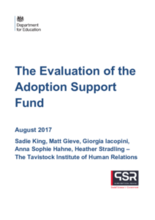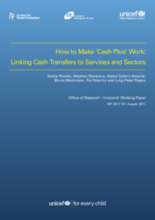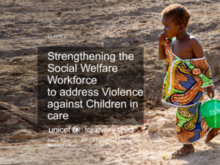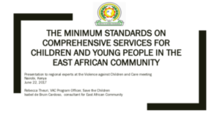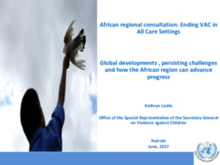Displaying 151 - 160 of 461
This article describes the findings of a four-year study with a cohort of children in out-of-home care in New South Wales and their experiences with the criminal justice system.
This report presents the findings of an evaluation of the UK's Adoption Support Fund undertaken by the Tavistock Institute of Human Relations.
This paper aims to identify key factors for successful implementation of increasingly popular ‘cash plus’ programmes, based on (i) a review of the emerging evidence base of ‘cash plus’ interventions and (ii) an examination of three case studies, namely, Chile Solidario in Chile, IN-SCT in Ethiopia and LEAP in Ghana.
This article presents the findings from the Mind Your Health study conducted in Northern Ireland, which analyzes the experiences of young people in care and their carers in accessing and engaging in mental health services.
This article explores the protection of smuggled and trafficked unaccompanied minors under the United Nations Protocols against the Smuggling of Migrants and Trafficking in Persons and calls for a more substantive protection-based framework to address the issue.
The 2017 Home Visiting Yearbook presents, for the first time, the most comprehensive picture available of home visiting on the national and state levels, revealing the breadth of home visiting in the United States and identifying the gaps in practice.
This independent review into Queensland's youth detention centres examined the practices, operation and oversight of the state's two youth detention centres in Townsville and Brisbane, in addition to evaluating the effectiveness of programs and services delivered in Queensland's youth detention centres.
This UNICEF presentation describes the need for social service workforce strengthening in East and Southern Africa and presents recommendations based on a case example from Rwanda.
This presentation provides a background on the East African Community (EAC) Child Policy (2016) and describes the minimum standards and corresponding framework and strategies for providing services to children and young people within the East African Community.
This presentation provides an overview of recent efforts and developments to end violence against children in all care settings around the world. Persisting global challenges and opportunities at the national, regional and global levels to end violence against children are also identified.

